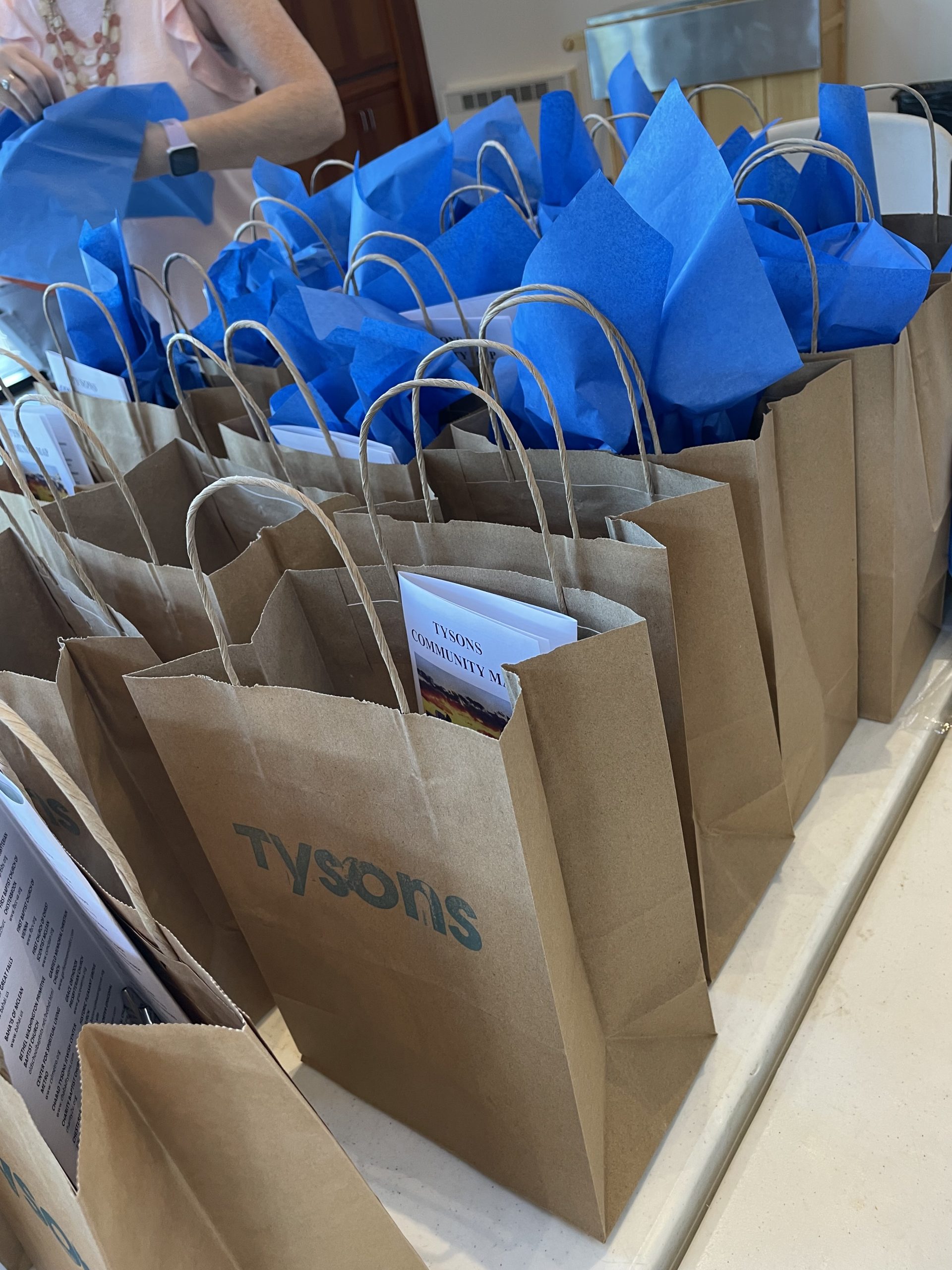
In December, when I started at Emmanuel Lutheran in Vienna as their associate pastor for evangelism and mission, I joined Tysons Interfaith right away. As someone entering my 10th year of ordained ministry, I have been part of a few ecumenical groups over the years, but this one is unique. As I attended our zoom meetings over the last year and participated in TI’s various discussions and forums, I’m so inspired by the work and passion that is happening in this group, despite the pandemic and its limitations.
At the end of July, I was finally able to meet some of the other members of Tysons interfaith in person, at Redeemer Lutheran in McLean to assemble “Welcome Bags” for new residents in Tysons. Our idea is to provide these bags to many of the major condominiums and apartment complexes in Tysons, to give away as new people move in. Inside each bag is a pen, magnet and lens cleaning cloth with the TI logo, a map of the community that includes a list of congregations in the surrounding area, a metro map, and a small package of tissues (because, pandemic!). We hope that new residents not only feel welcomed and connected to the community, but also learn that TI and these faith communities are ready resources. These bags will be going out in the next few weeks, to create a sense of connection and inclusion to the newcomers in our midst.
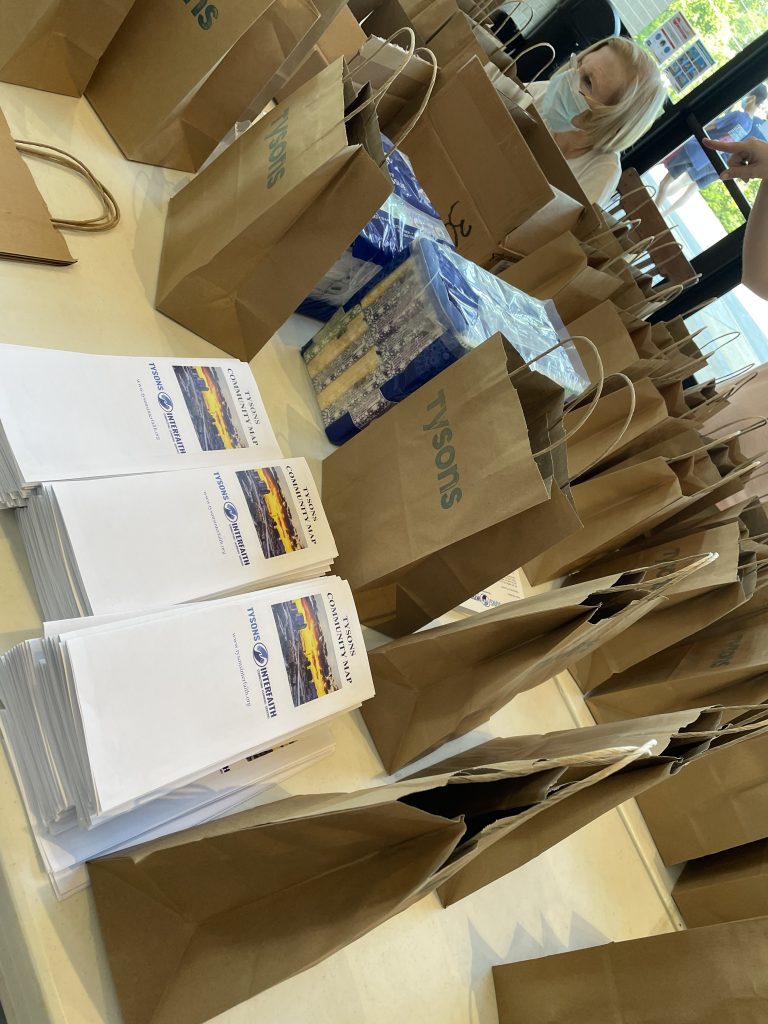
As someone still fairly new to NOVA, I’m so appreciative to have this group of passionate colleagues to work along with, and I am relieved that none of us are doing this alone. As a Christian and as a Lutheran, I believe that God is already present and at work in the community of Tysons, and God is continually inviting us alongside this work, as fellow participants. I’m thrilled to be along for the ride!
This blog post is the expressed opinion of its writer and does not necessarily reflect the views of Tysons Interfaith or its members.
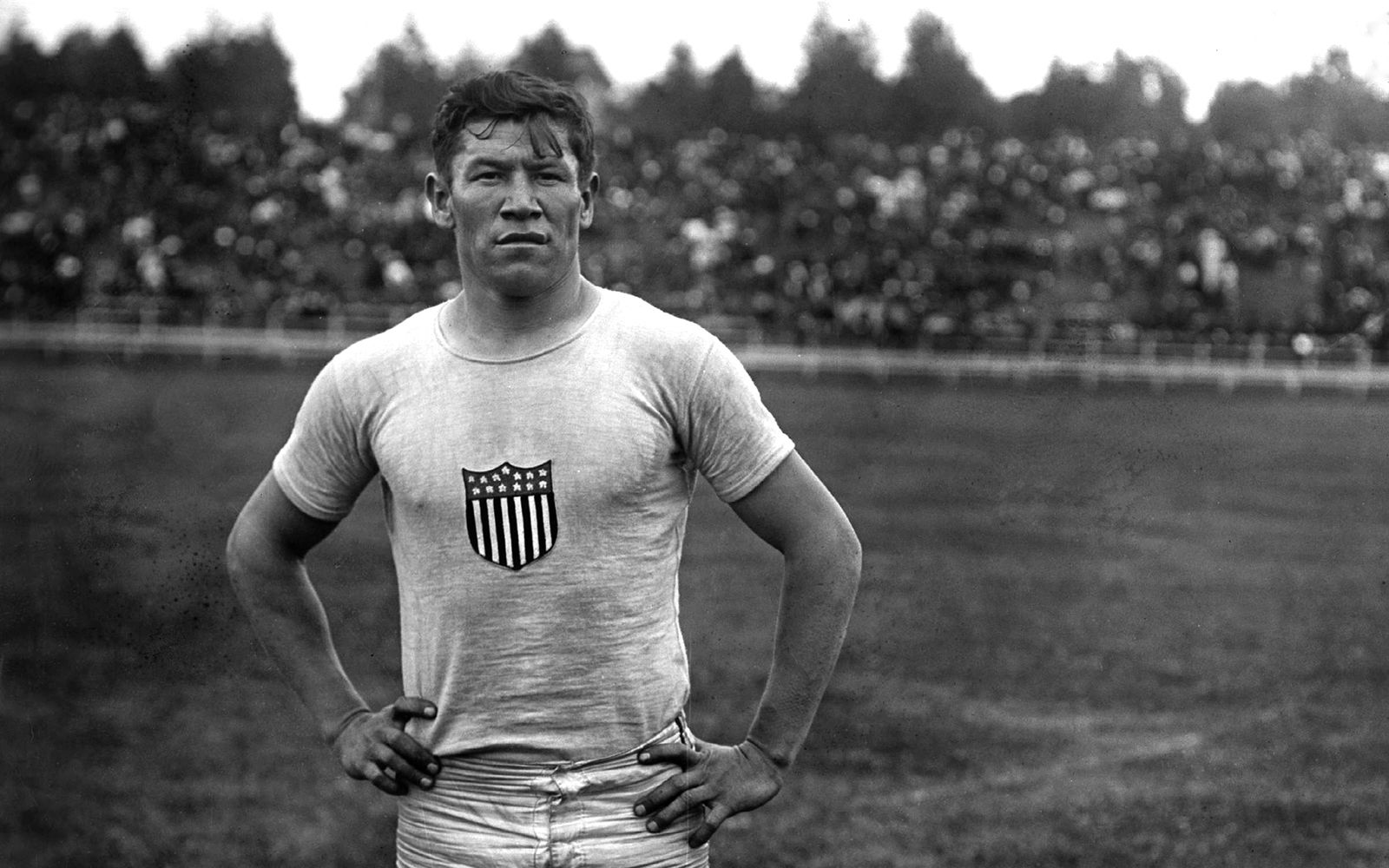
A recent BBC program reported on the controversy surrounding the “residence schools” established in Canada to “wring the Indian out of indigenous children.” Publicly funded, the schools were mostly established and run by the Roman Catholic Church and did not finally disappear until the 1990s. https://www.bbc.co.uk/programmes/m000xzdm
I first learned about the U.S. version of this program when I participated in the annual “Jim Thorpe Day” competition at the Army War College in Carlisle, PA, the site of Thorpe’s on-again, off-again alma mater (he had trouble staying in school). Thorpe became an Army legend, possibly America’s greatest Olympic and professional sports champion ever and, lesser well known, a successful Hollywood actor. https://www.vice.com/en/article/z4d74a/a-thanksgiving-reminder-jim-thorpe-is-a-native-american-hero
Despite a bit of European ancestry, Thorpe was generally regarded as wholly American Indian, which made him both a curiosity and an advertisement for assimilationist policy. The founder and head of the Carlisle school, for example, believed that Native Americans must convert to Christianity and seek an education to prepare for success in the dominant culture. He once wrote that the U.S. government must “kill the Indian…to save the man.” His hubris, and a lack of proper oversight led inevitably to cases of physical, mental, and sexual abuse, only some of which have been belatedly prosecuted. Run by secular staff from the BIA (Bureau of Indian Affairs), Protestant religious organizations, or Catholic religious orders and parishes, the schools were part of what many call a program of “cultural genocide.”
Thorpe did not talk about this, but during his Hollywood career – he appeared in more than 70 films – he earned the title “Akapamata,” which in his Sac and Fox heritage means “caregiver.” His experience as co-founder and first president of what became the National Football League came in handy when he approached the BIA for a grant to launch an “Indian Center” in Los Angeles.
Together with a Native-American partner, Cecilia Blanchard, Thorpe formed what Blanchard’s great-granddaughter called a ‘Welcome Wagon’ for the Native peoples streaming in from all over. https://www.americanindianmagazine.org/story/akapamata-forgotten-hollywood-legacy-jim-thorpe. They would match the new arrivals with casting calls and auditions and, unwelcome in the city, organize Saturday-night potluck gatherings on the outskirts of town where the women used a traditional “dinner fire” to cook the game the men cleaned. All this eventually led to the Native American Actors Guild, formed because the Screen Actors Guild was even less welcoming than the Angelinos.
In the words of Blanchard’s great-granddaughter: “The industry was racist. They were portraying a vanishing people and a dying culture, and they were portraying it over and over again. That wore on the Natives’ psyche. That wore on their hearts. We are a proud people. We have worked hard to survive. Jim realized this and knew he had the best agency to create change. He tried to offer them an opportunity to be more than society was telling them they were going to be…. He went to his grave fighting for equal pay for Native actors and decent health insurance, especially for the stuntmen! Jim’s valiant effort laid the early groundwork for the benefits enjoyed today by indigenous people in the industry where we are still trying to crack the glass ceiling of film and media and taking back control of who we are as a people.”
Reflecting on the life and legacy of Jim Thorpe, I think he was an American hero on the order of Jessie Owens and Jackie Robinson, a man who could be embraced by Americans of any background. He is revered by the Army because he adopted its values of loyalty to service and country, action on the field of battle, and the performance of great deeds. He was embraced by most of his countrymen despite his Native American background and ongoing controversy and contradictions. These include his lifelong battle with alcoholism; his fraught marital life; the infighting among his heirs over whether he should be buried in the Pennsylvania town that took his name or back in Oklahoma on his ancestral lands; and the embarrassment of having the International Olympic Committee first strip him of his track and field medals because they found out he had played semi-professional sports and only posthumously reversing their decision. He had matchless God-given talents, but he also benefitted from the unique teaching and coaching that helped mold his individual talents into greatness. It is impossible to ascertain whether our efforts to wring the Indian out of him resulted in Jim Thorpe being more Christian and “American” than what he most certainly was: a hero of the Sac and Fox nation.
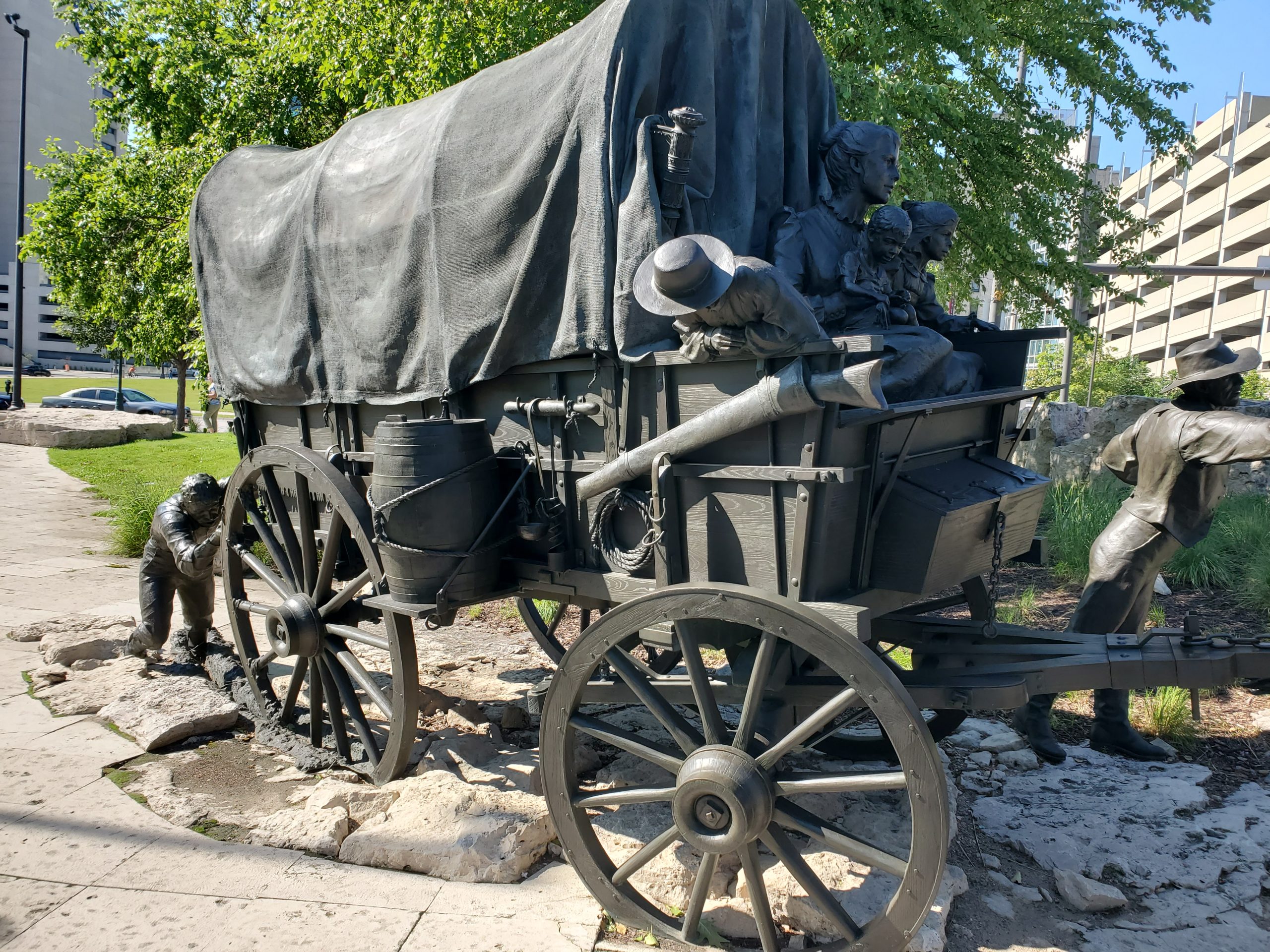
Every July 24, the State of Utah celebrates Pioneer Day, a major state holiday. Pioneer Day commemorates July 24, 1847, when an early contingent of Mormon pioneers, led by Brigham Young, entered what is now the Salt Lake Valley. They had made a long trek to find a place of refuge from religious persecution. The holiday is marked in many Utah cities and towns by a parade with pioneer-themed floats.
On a recent road trip through the West, we saw some key points along the trail that led to the settlement in Utah. The first was Winter Quarters (current day Omaha), the embarkation point where the Mormon pioneers spent two winters preparing for the trek west. Downtown Omaha has an extensive monument to the Mormon and other pioneers that went west in wagons, on horses, or on foot pulling handcarts. There is also a cemetery where 600 of the 4,000 Mormon pioneers who spent those difficult winters are buried – they didn’t make it west. Overlooking the cemetery is a powerful bronze sculpture commemorating the sacrifices and faith of those pioneers – by sculptor Avard Fairbanks, who coincidentally sculpted the busts of George Washington that frame the campus of George Washington University. The sculpture is placed directly over the graves of an unknown child and seven other pioneers.
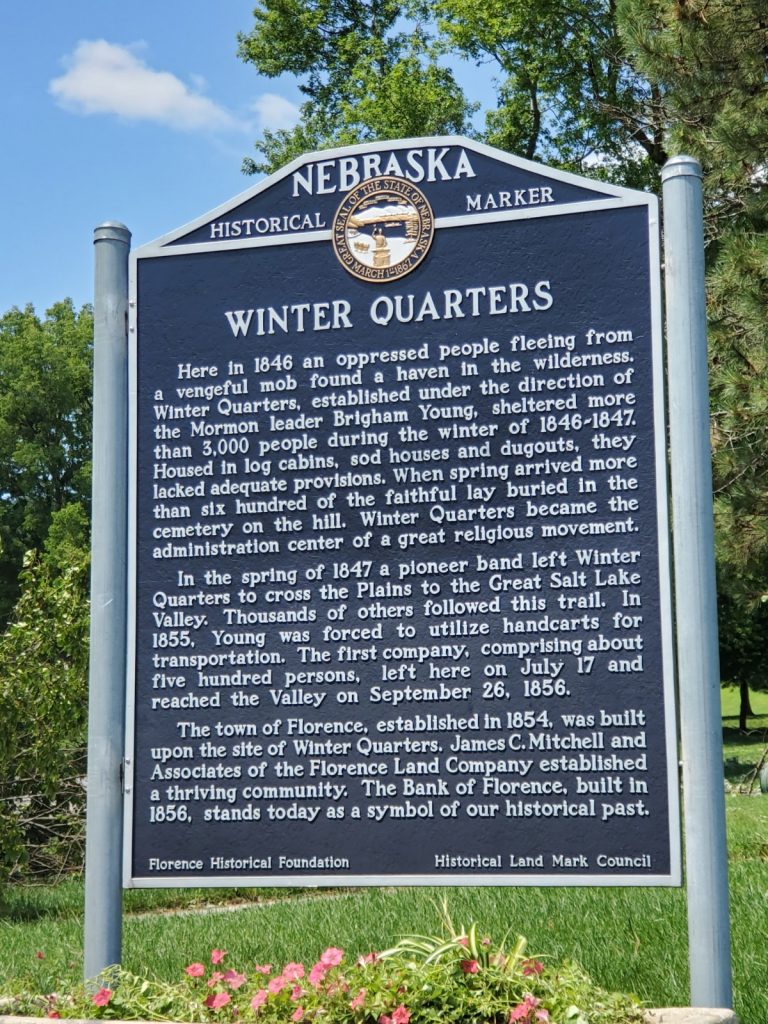
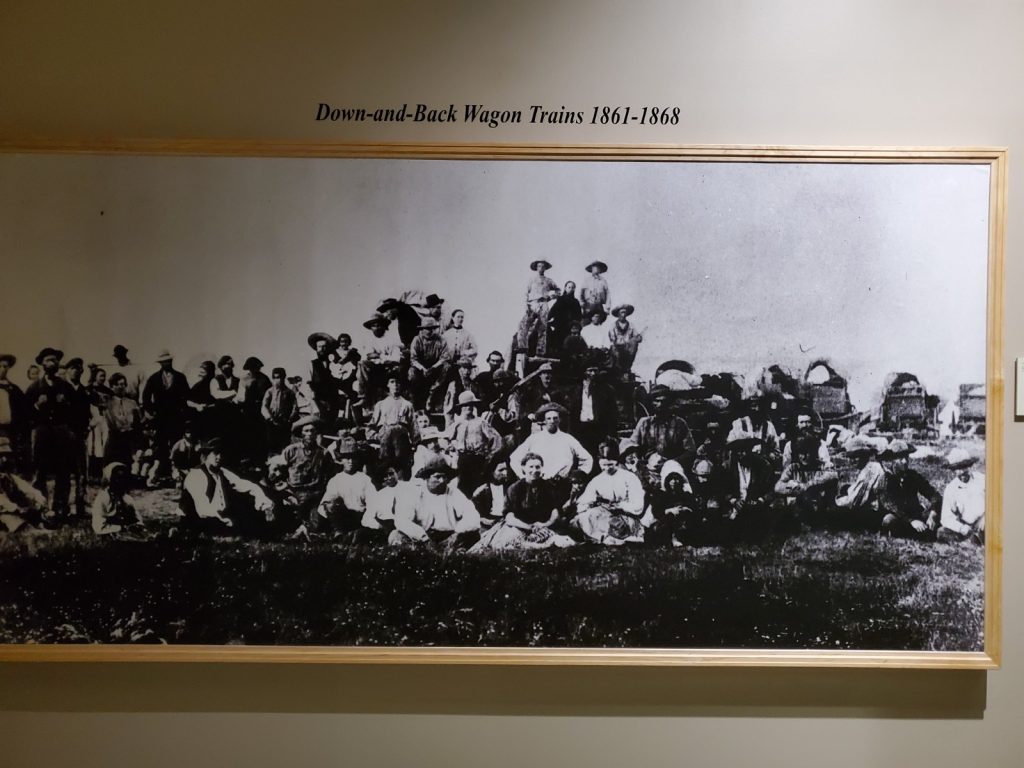
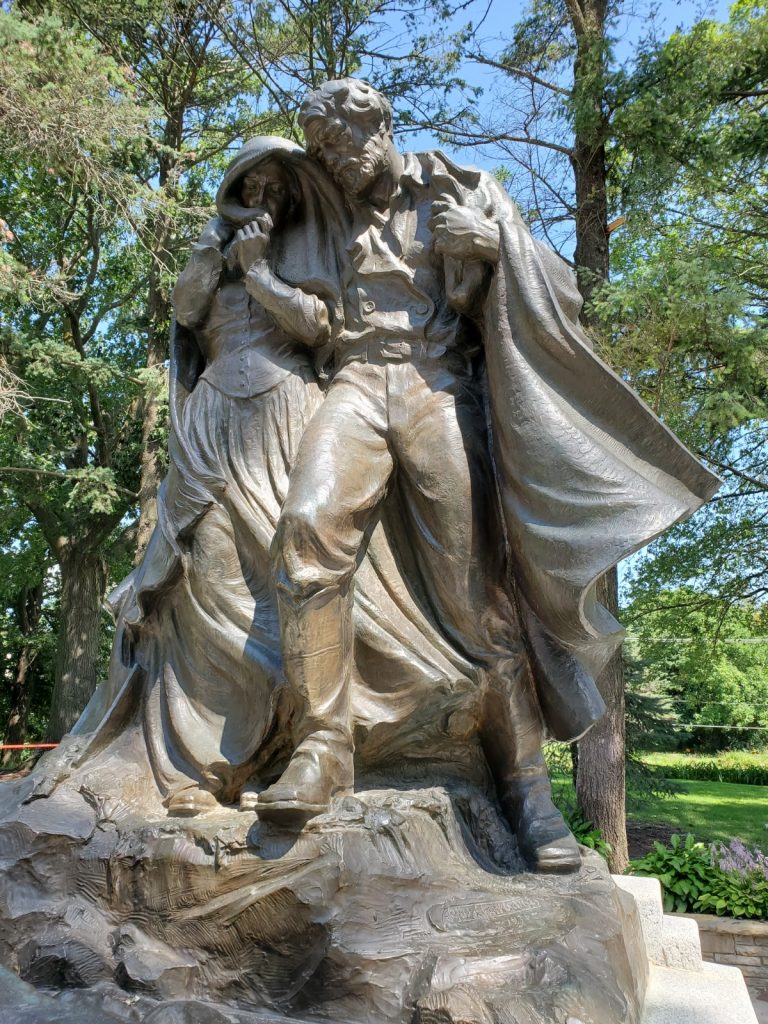
About 450 miles to the west is Chimney Rock in the North Platte River Valley. Not only is it the most recognizable landmark on the Mormon Trail (and the Oregon Trail that parallels it) because of its unique shape, it also marks the end of the flat part of the trail and the beginning of the mountainous terrain that culminates in the Rocky Mountains. Near Chimney Rock is a grave marker for Rebecca Winters, a mother of 4 who died from cholera along the trail. It was very moving to see that a family friend had taken the effort to carve her name in an old wagon wheel to memorialize her sacrifice and her importance as an individual. Her descendants later added a more traditional grave marker.
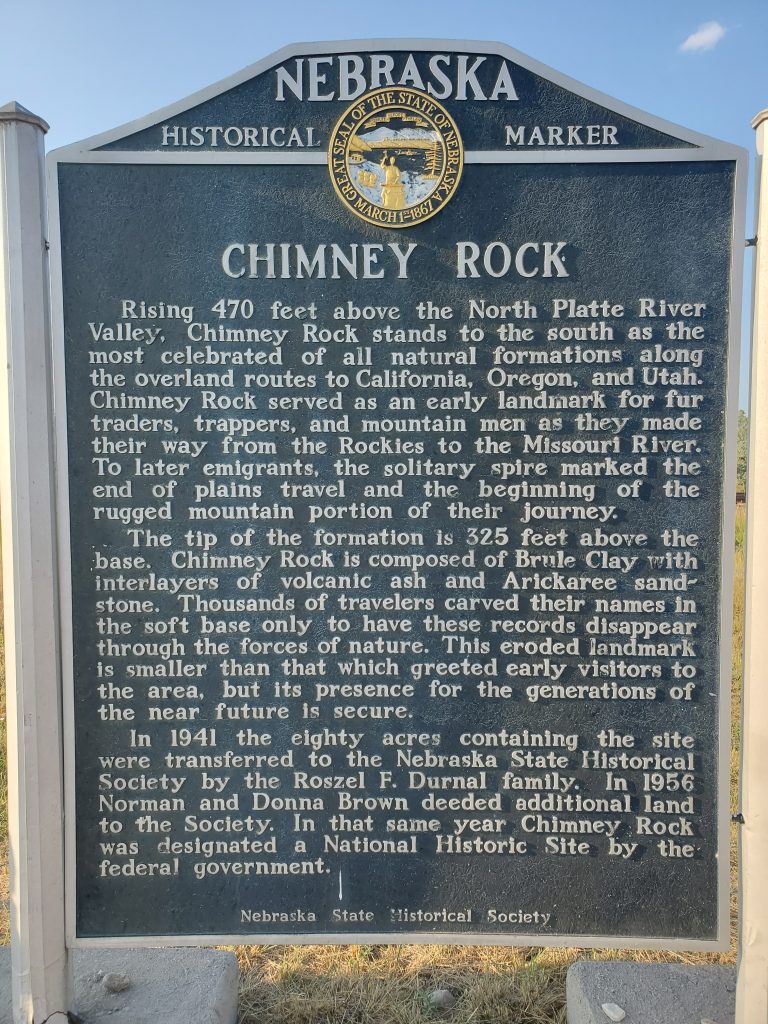
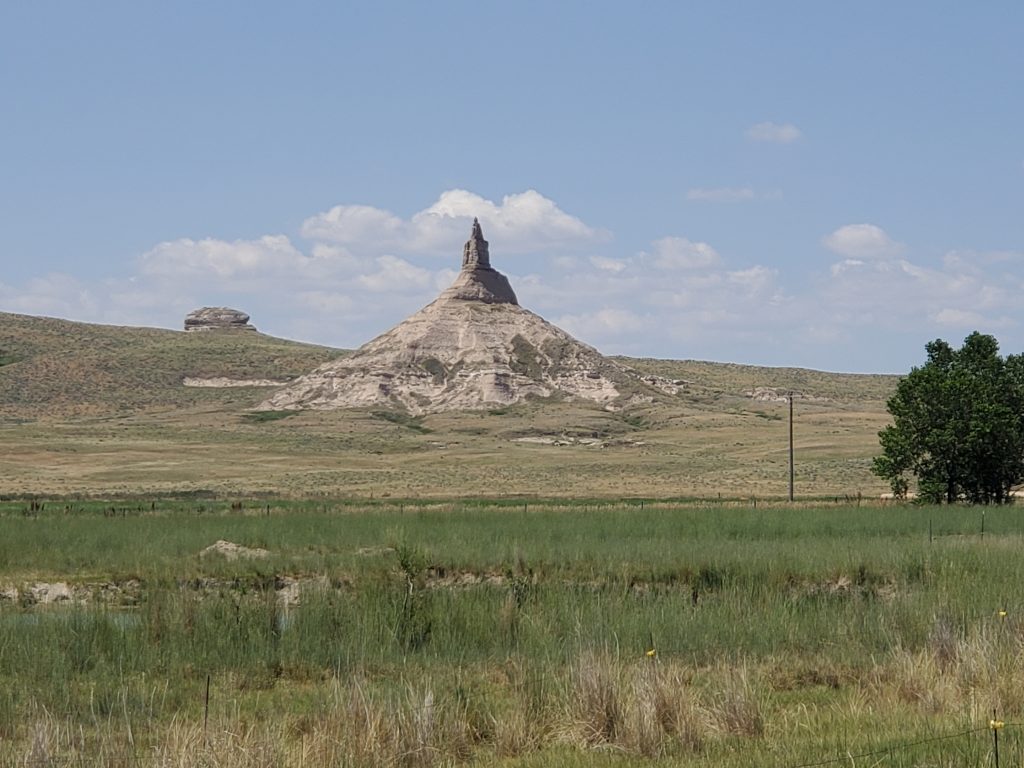
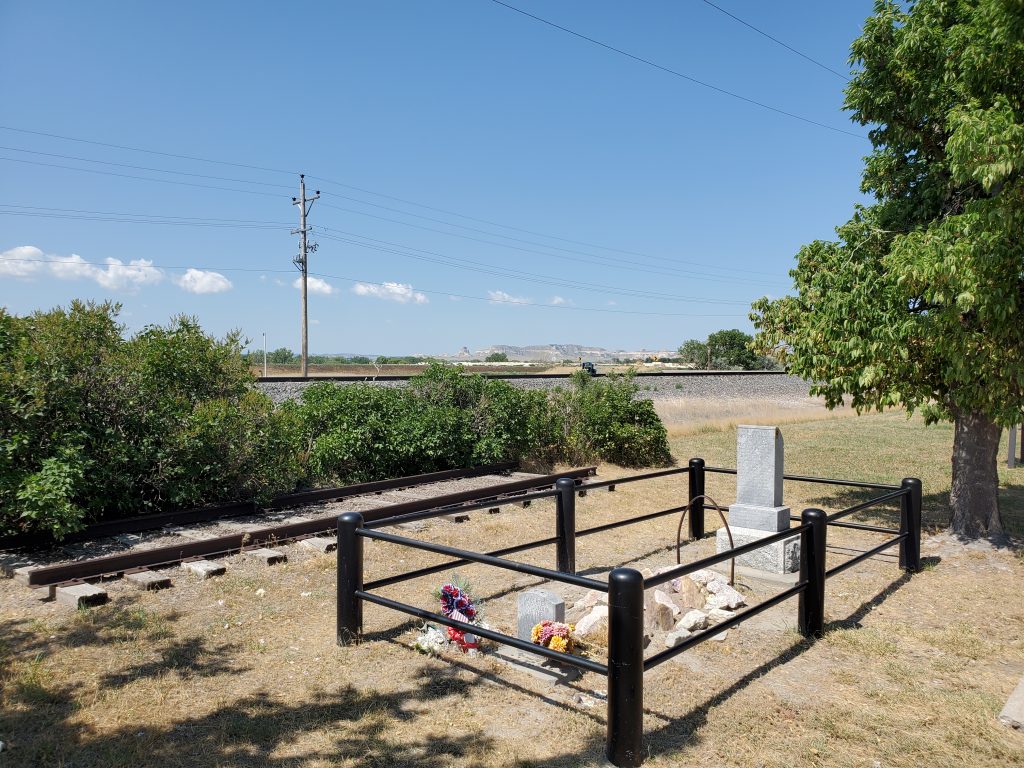
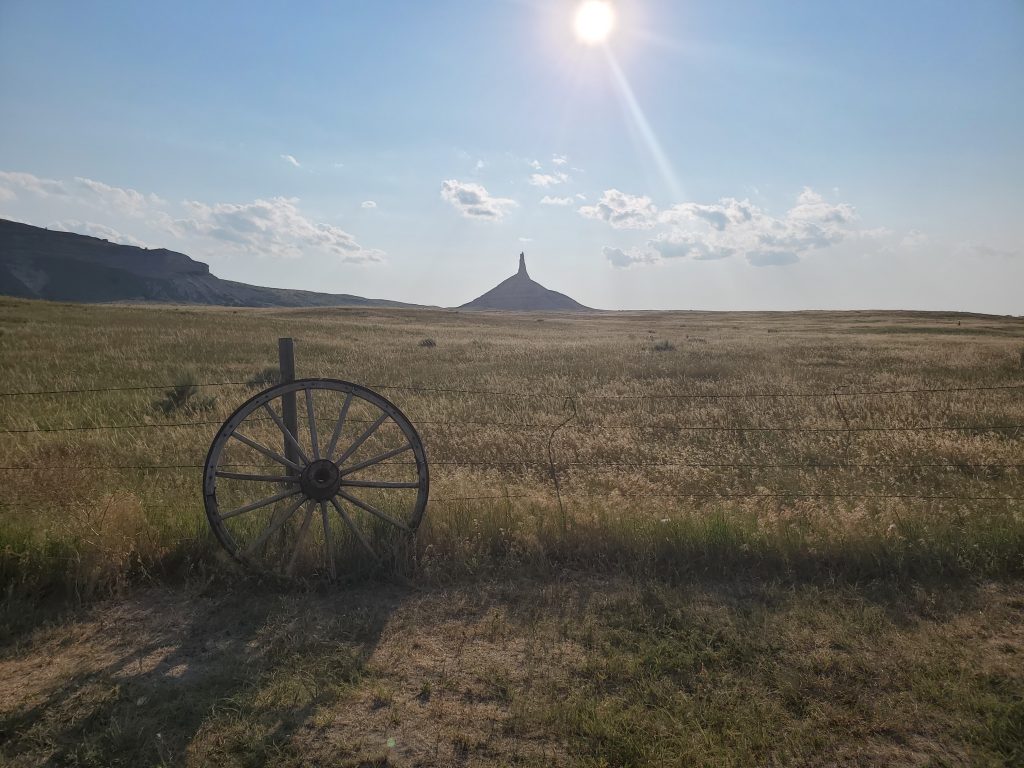
The Mormon Trail is sacred ground for members of our church, the Church of Jesus Christ of Latter-day Saints. Both of us have ancestors who were among the 70,000 that went west, through great hardship, to find a place of peace to live and worship. What motivated these pioneers to make this dangerous trek? As one of our church leaders summarized a few years ago:
“The foremost quality of our pioneers was faith. With faith in God, they did what every pioneer does – they stepped forward into the unknown: a new religion, a new land, a new way of doing things . . . Two companion qualities evident in the lives of our pioneers, early and modern are unselfishness and sacrifice.”
This blog post is the expressed opinion of its writer and does not necessarily reflect the views of Tysons Interfaith or its members.

There is lots of summer left, and with it — opportunities to get out on a summer’s evening and enjoy free music in and around Tysons! Thursday evenings are particularly hopping, with a number of concert series offerings:
- The Boro Summer Live Music Series featuring local artists runs Thursday evenings through September 9 from 5:30 pm to 8:00 pm on the Upper Promenade near Boro Park in Tysons (8350 Broad Street, Tysons). Information about this series and other happenings at the Boro can be found here.
- Tysons Corner Center presents The Plaza Live! through October on Thursdays from 4:00 pm to 7:00 pm and on Saturdays from 2:00 pm to 7:00 pm on the Plaza at Tysons Corner Mall. Additional information can be found here.
- The Nottoway Nights Concert Series are held on Thursday evenings in July and August at 7:30 pm at Nottoway Park (9537 Courthouse Road, Vienna). Bring a blanket or lawn chairs. Additional information and a list of performers can be found here.
- The City of Falls Church is again presenting its Concerts in the Park at Cherry Hill Park, 312 Park Avenue, Falls Church on Thursday evenings from 7:00 pm – 9:00 pm. Blankets or lawn chairs suggested. Additional information can be found here.
And while not free, there is something going on almost every night of the week at nearby Wolf Trap, where you can reserve a seat or bring a blanket and a picnic dinner. Their calendar can be found here.
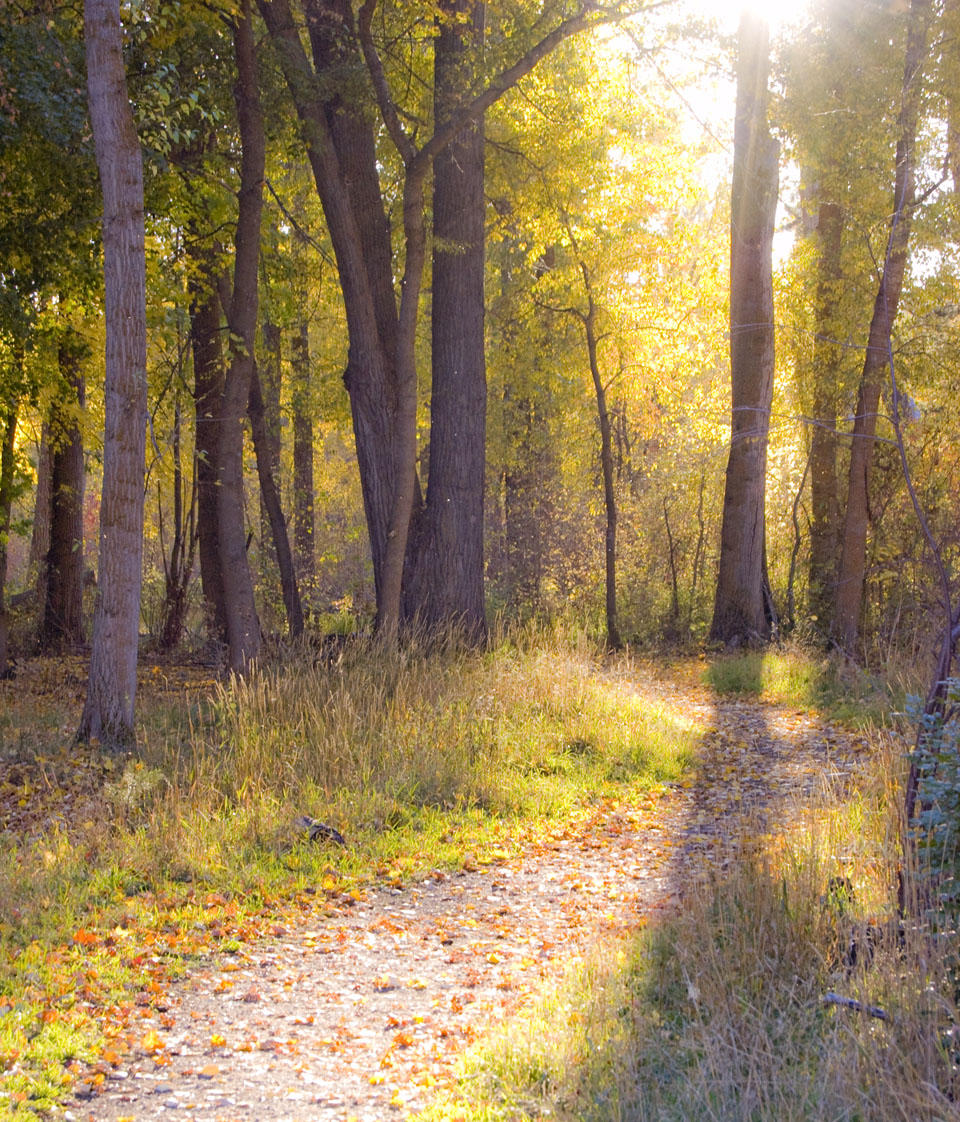
I’m finding that the transition out of COVID is stressful for me. And if conversations I’ve had are any indication, the transition is stressful and for many of us. We are in that funny time where we are working toward freedom (our Reston family had our first meal together in an actual restaurant last night!) but we aren’t all the way there yet.
One word for times of transition is liminal, which means occupying a position at, or on both sides of, a boundary or threshold. Liminal times can be exciting, but they can also be stressful. Figuring out what life looks like as we cross a boundary can be invigorating. It can also be exhausting. I was thinking about this particular liminal time when I read a reflection written by one of the Assisting Bishops in the Episcopal Diocese of Virginia, Bishop Porter Taylor. He shared this poem by Wendell Berry called “The Peace of Wild Things.”
When despair for the world grows in me
and I wake in the night at the least sound
in fear of what my life and my children’s lives may be,
I go and lie down where the wood drake
rests in his beauty on the water, and the great heron feeds.
I come into the peace of wild things
who do not tax their lives with forethought
of grief. I come into the presence of still water.
And I feel above me the day-blind stars
waiting with their light. For a time
I rest in the grace of the world, and am free.
In this liminal time, I find that I am needing the peace of wild things. I need time surrounded by nature. I need quiet and rest. And I certainly need to remind myself not to be taxed with the forethought of grief and anxiety.
I hope that you are able to find times and spaces for refreshment, whatever that looks like for you. Can you take a walk in nature? Can you watch the birds from a chair on your porch? Does your dog, your cat, or your gerbil make you smile? Where can you rest in the grace of the world and be free?
This blog post is the expressed opinion of its writer and does not necessarily reflect the views of Tysons Interfaith or its members.
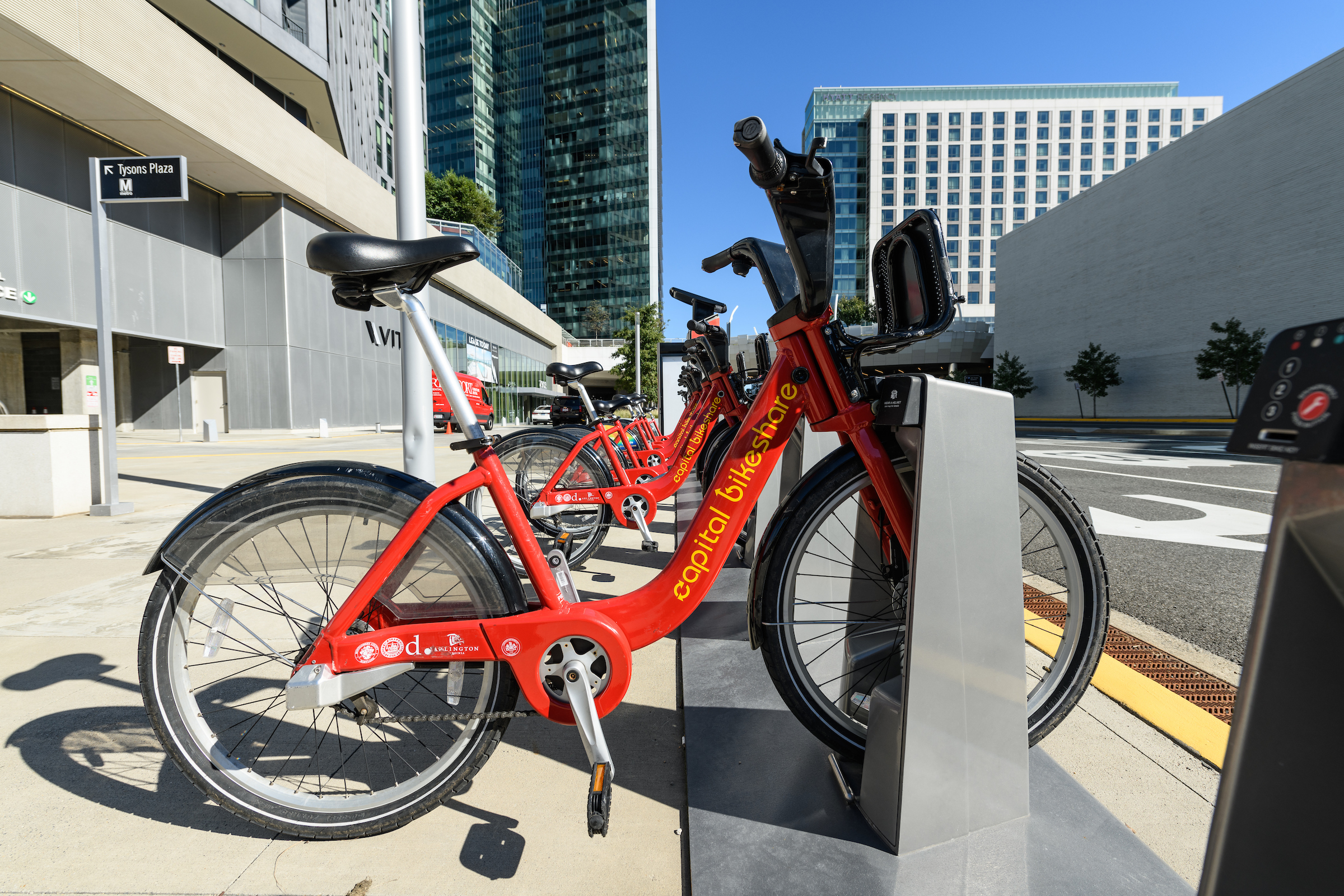
As I wrote in an earlier post, Tysons can be a good if not great place for biking and hiking. But when Fairfax County shuts down one northbound lane of Tysons Boulevard to vehicular traffic beginning on July 6, you must at least try one time for yourself. Capital Bike Share station map
The Bike Share bikes are heavy, so if you procure one, you will go slow, not such a bad thing even in these pandemic times. Tysons Boulevard is not as busy as International Drive but believe me it can get a bit of traffic. So, closing it off to allow pedestrians and cyclists is a good tradition to have.
Let me remind you that in addition to access to Tysons Galleria, you can easily access one of the few trails in Tysons. Even before you enter the closed portion of the street, take a right down West Branch and then enter the trail on your left. It will take you to the (artificial turf) soccer field.
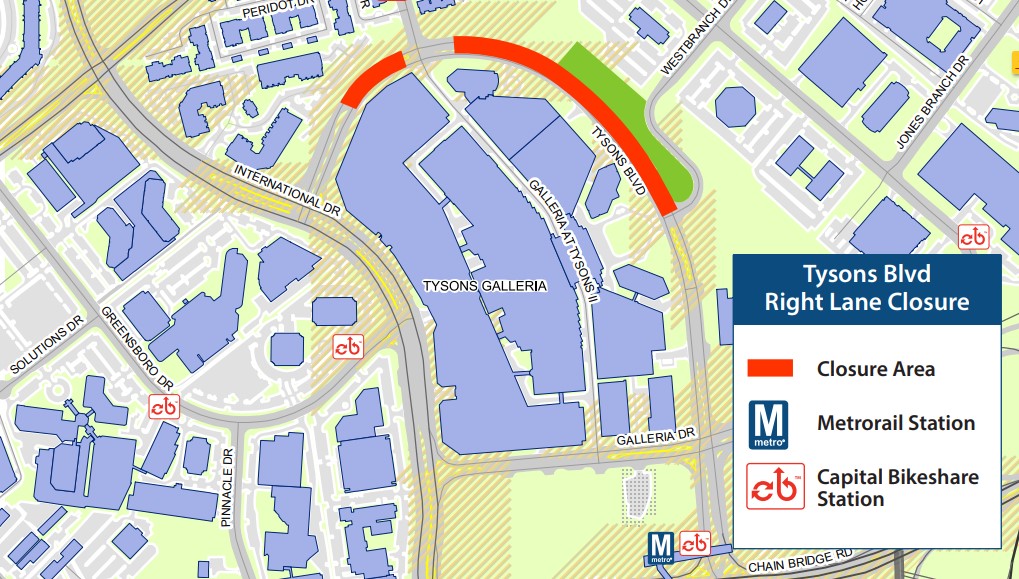
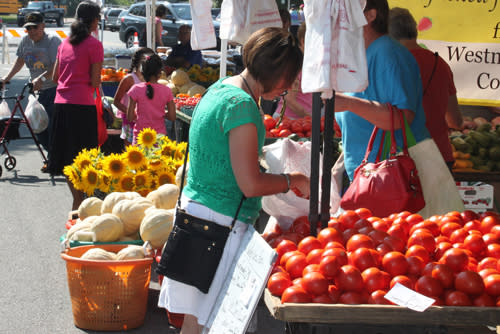
As delicious local summer and fall produce reaches its peak, you might want to check out the bounty that can be found at our local farmers’ markets. These markets offer a wide variety of locally grown and produced fruits and vegetables, flowers, dairy products, baked goods – even soaps, jams and pickles! Wear your walking shoes and bring a basket or shopping bag, because you never know what treasures you might find as you support our local farmers and businesses.
- The FRESHFARM Farmers Market at the Boro is located in the heart of Tysons in the new Boro residential and shopping district off of Route 7. You can find it behind the Loft Building at 8399 Westpark Drive on Thursdays from 3:00 pm to 7:00 pm through October 28th. Read more here.
- The Falls Church Farmers Market To Go is open every Saturday from 8:00 am to Noon. It is located at 300 Park Avenue, Falls Church. Additional information can be found here.
- The McLean Farmers Market is open every Friday through November 12 from 8:00 am to Noon. It is located at 1659 Chain Bridge Road, McLean. Additional information can be found here.
- The Vienna Farmers Market, sponsored by the Optimist Club of Greater Vienna, is open Saturday mornings through October 30. It is located at the Vienna Community Center, 120 Cherry Street, SE, Vienna. Additional information can be found here.
- The NOVA Central Farm Market is open year round on Sundays. April through December hours are 8:30 am to 1:00 pm. It is located at the Church of the Holy Comforter, 543 Beulah Road, Vienna. (The Church of the Holy Comforter is a member of Tysons Interfaith.) Additional information can be found here.
- The FRESHFARM Farmers Market Mosaic is open Sundays through December 26, 9:00 am to 2:00 pm. It is located at 2910 District Avenue, Fairfax. Additional information can be found here.
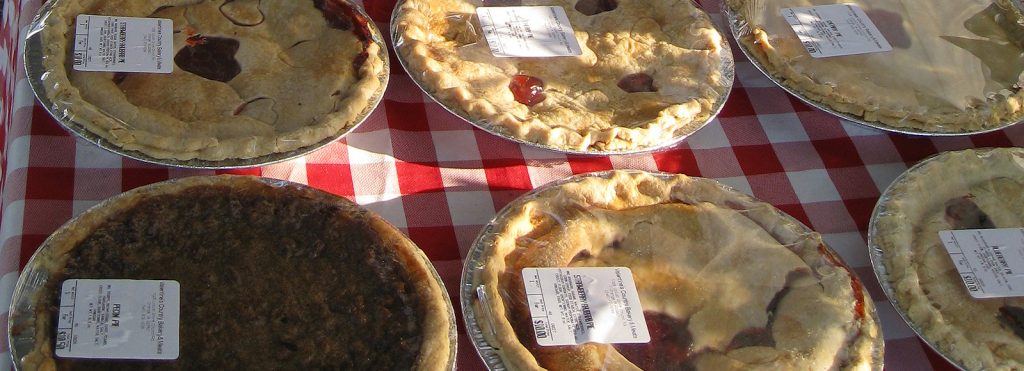
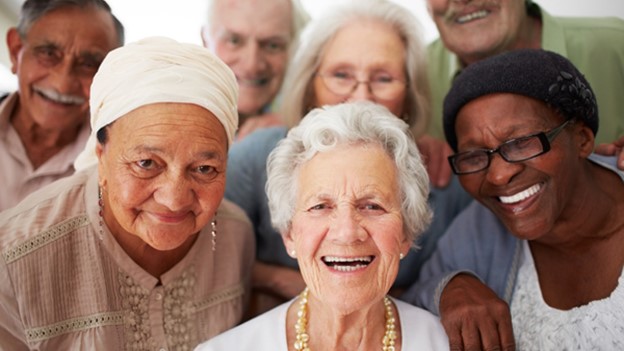
Did you know?…….. The National Council on Aging has a wonderful tool for exploring benefits that are available for seniors that they may not be aware of. According to the National Council on Aging, there are 2,500 benefit programs for seniors nation-wide. Their on-line tool enables seniors (or volunteers/family members helping them) to explore programs that may be available to them in their local area. The types of programs that exist for qualifying seniors may include medication and other health care cost assistance for items such as copays and deductions; income and pension assistance; food and nutrition assistance; housing, transportation, and utilities assistance; tax relief; veterans programs; employment tools; respite care; parks and recreation discounts and educational programs.
Not only is this a great opportunity for seniors to learn about programs that may be available to them, it is also a great tool for individuals, faith communities and others who would like to volunteer their time and talent to help our seniors access these helpful benefits.
For more information, please visit: https://www.benefitscheckup.org/
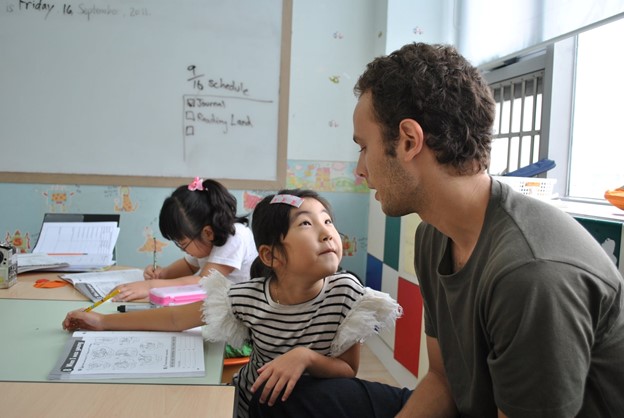
The Republic of Korea or South Korea is special in that it is the only Peace Corps-recipient country to create its own similar agency (KOICA) and because we got there late when the poverty most Americans expect to see in places we send our volunteers was disappearing. They also have more Christian missionaries around the globe today, second only to us. Here are some photos dating back to my days in South Korea as a Peace Corps volunteer: a typical bus ride; a look out from inside such a bus; a traditional house found only at museums now:
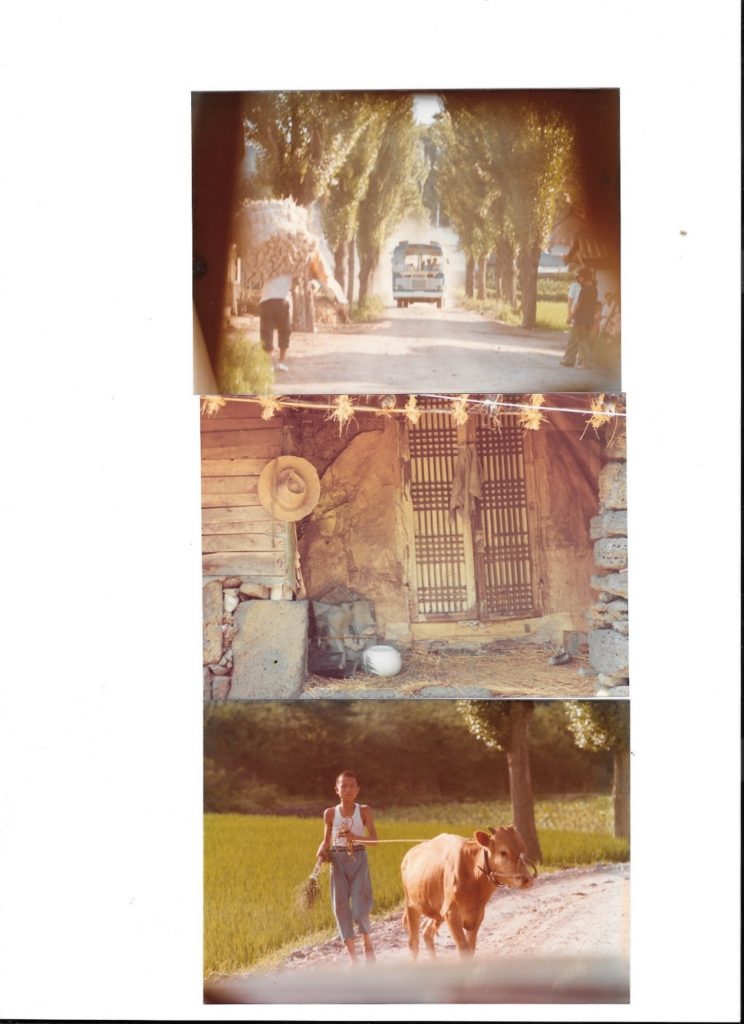
More follow of old men at Heiinsa (Buddhist) Temple, home to the oldest print blocks (Buddhist scriptures) in the world (and you thought Europe invented printing); a sign suggesting there was good reason for us English volunteers to be teaching middle school in the first place (the “23th Century” bit should read “In Year 23 of the reign of King Kong Min of the Goryeo Dynasty” — that’s 1371 CE by the way, the king and his dynasty fading away not long after); and how the typical Korean middle school student approached learning English back then:
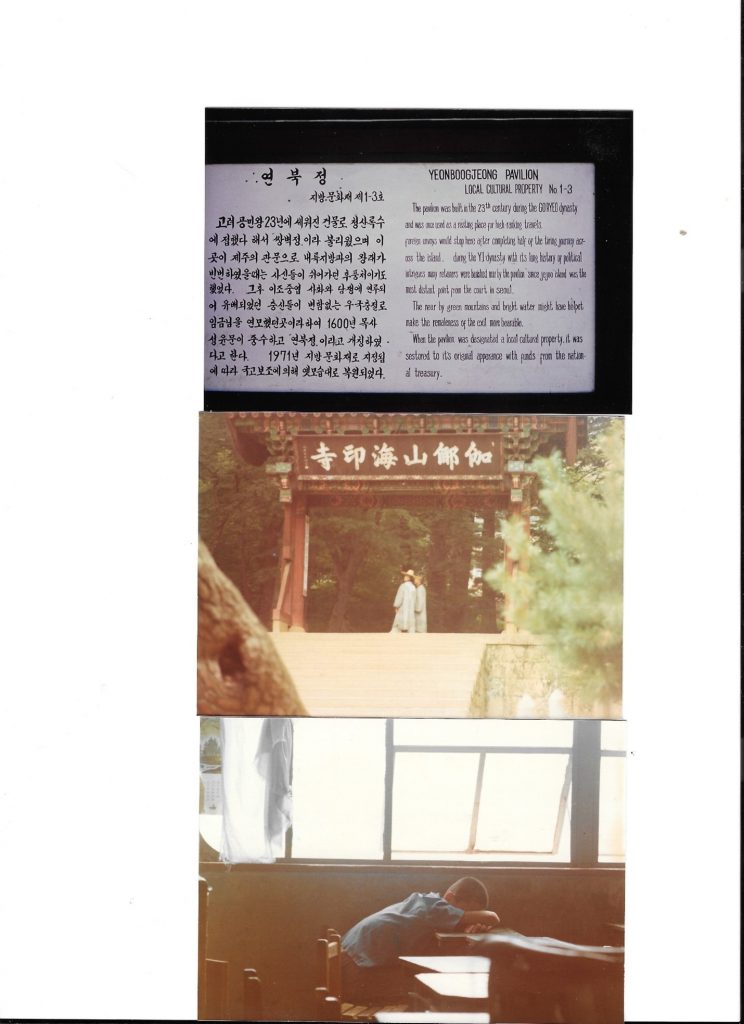
But then look at this recent photo showing a cute elementary school girl student rapt in attention at the teaching of the hip son of a K-30 Peace Corps volunteer (we instantly date each other by our group number):

A good many years have elapsed since my days in the Peace Corps and his. But the beauty of the endeavor is still the same.
Some of us from my K group and a few others had a reunion of sorts recently enjoying each other and being unmasked in the beautiful sun of Front Royal. Lots of Korean and American food and drink. Our old Peace Corps Korea Director was there, and as our eyes rolled, he famously again lectured us on the importance of these sacrosanct Peace Corps goals:
1. To help the people of interested countries in meeting their need for trained men and women.
2. To help promote a better understanding of Americans on the part of the peoples served.
3. To help promote a better understanding of other peoples on the part of Americans.
There is an obvious connection to what Tysons Interfaith is about. Promoting better understanding between people wasn’t a bad idea then and it ain’t such a bad idea now, either.

It may seem strange to talk about spirituality and Chinese communism, but an article posted by a former colleague on LinkedIn recently got me thinking about my days as an economic officer in our embassy in Beijing more than 20 years ago.
Back then I often hung out in a crowded, run-down “salon” bearing the unusual name of the Unirule Institute of Economics ( 天則經濟研究所) UNIRLE (unirule.cloud) I was the only foreigner in the crowded room listening to the debates between the economists and lawyers from all over China. One day one of the founders, Mao Yushi (no relation to the Chairman and the name just happens to be spelled the same in English) invited me to his home, the first private residence I had ever seen: an apartment worth a lot of money today.
Professor Mao made some tea and we sat for a bit. At one point he said, “Let me tell you something about the Communist Party: there are ‘free thinkers’ like me who are supposed to talk to people like you and give our best advice to the decision-makers who can’t talk to you or let you know what they are thinking.” It was an epiphany.
I was saddened to learn recently that after flourishing for many years after I left Beijing, in 2013 Professor Mao got into trouble for writing an article calling for Chairman Mao to be reevaluated and for his body to be removed from his mausoleum. There’s even a Youtube video showing Party members chanting “Down with the traitors [former premier] Wen Jiabao and Mao Yushi.” And in 2019, Chairman Xi Jinping finally shut him down altogether. Well, Professor Mao did win the Cato Institute’s Milton Friedman Prize for Advancing Liberty. (The Milton Friedman Prize for Advancing Liberty | Cato Institute).
In an interview with Radio France International’s Chinese service on the occasion of his 90th birthday, Professor Mao said this (my translation): “You asked me if I’ve ever wanted to live in a different time or in a different country? Well, of course, if I had the choice I’d love to go to America. But that’s my individual concern. I’m not thinking only of myself; I’m thinking of everyone. Can everybody go to the States? Of course not. But what is possible is to reform our country so it’s a bit more like America. That is both possible and worth striving for with all one’s might.”
I never talked to Professor Mao about religion, but like all good Communists he probably considers himself a materialist. Still, it is interesting that the term “unirule” is an awkward translation of a classical Chinese concept that other famous Western scholars have translated as “heaven.” One passage in the Confucian Record of Music was translated by a renowned Scottish missionary like this:
When one has mastered completely (the principles of) music, and regulates his heart and mind accordingly, the natural, correct, gentle, and honest heart is easily developed, and with this development of the heart comes joy. This joy goes on to a feeling of repose. This repose is long-continued. The man in this constant repose becomes (a sort of) Heaven. Heaven-like, (his action) is spirit-like. Heaven-like, he is believed without the use of words. Spirit-like, he is regarded with awe, without any display of rage.
Like the Chinese Communist Party, the Confucians didn’t talk about religion, but for a guy who loves singing in the choir at my church, the passage is music to my ears. Maybe we should translate “unirule” as “oneness of humanity?”
